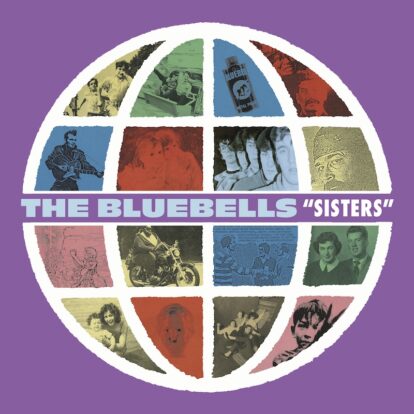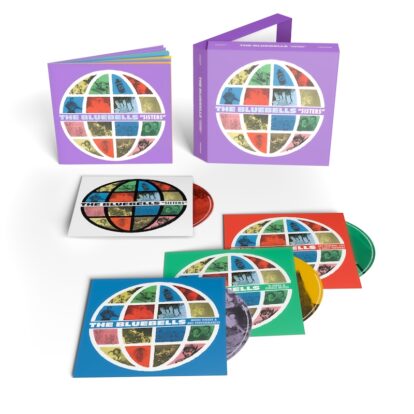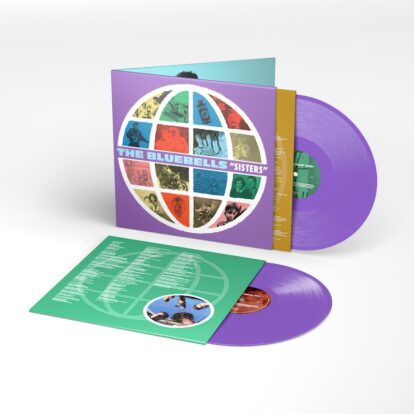Classic Pop talks with The Bluebells’ Robert Hodgens about the reissue of the band’s debut LP, Sisters
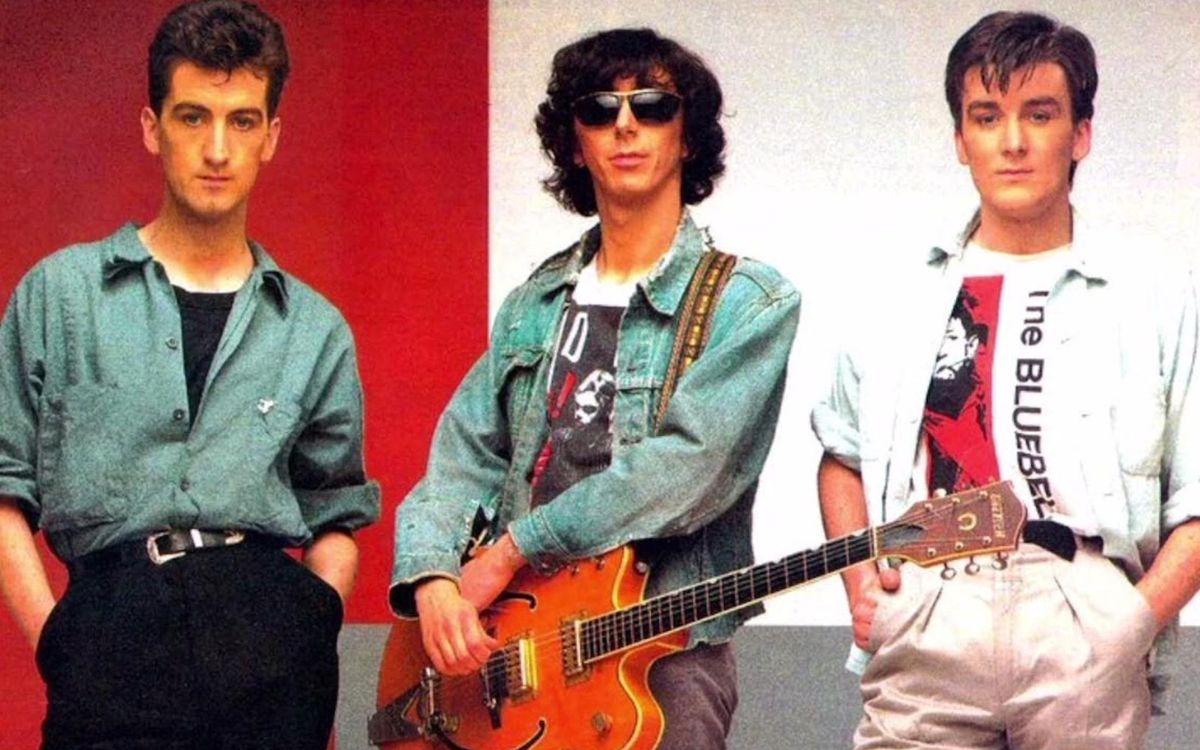
The Bluebells’ acclaimed debut LP Sisters is being reissued in deluxe expanded form.
A remastered version of the 1984 album, containing the singles I’m Falling and Young At Heart, will be available as a double LP for the first time on black or limited edition purple vinyl. In addition, a deluxe 3CD/DVD set scoops up B-sides, non-album tracks, live and extended versions as well as previously unreleased BBC performances from The Old Grey Whistle Test and Top Of The Pops.
Classic Pop caught up with the band’s Robert Hodgens to talk about the new reissue.
Was there friendly competition or a sense of kinship with fellow Scottish new wave bands like Aztec Camera and Orange Juice?
Robert: Well, there was definitely a friendship. Basically, I wouldn’t have been in a band if I hadn’t kind of fallen in love with Orange Juice when I first saw them play live. Edwyn [Collins] let us play support on lots of Orange Juice gigs. [Postcard Records label boss] Alan Horne would drive us to lots of our gigs, too.
The first time I ever sang in a studio was doing backing vocals on Sing A Holiday Hymn at the Hellfire Club Studios in Glasgow, a demo of the Vic Godard song that Orange Juice covered at the time.
Then we did various Postcard Event nights in London, Edinburgh and Glasgow, with Aztec Camera and Orange Juice. I think the Jazzateers as well. They were definitely a really big help to us. And I must say so were Altered Images – they were extremely supportive. In later years, we were joined by Craig Gannon from Aztec Camera and now, of course, Campbell Owen from that band is a fully-fledged member of The Bluebells, so the circle continues.
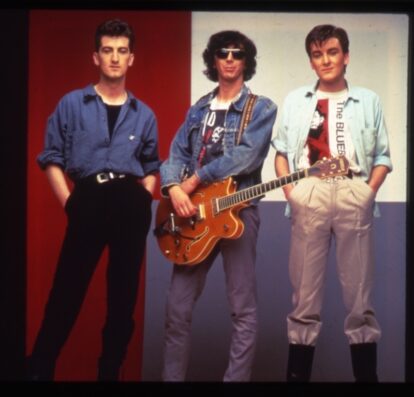
You were the first unsigned band to appear on The Old Grey Whistle Test. Were you surprised when you got that call?
We were kind of surprised to get the invite for The Old Grey Whistle Test to be honest. We’d just been on the cover of the Melody Maker – I think the magazine’s editor Allan Jones really liked us and Paolo Hewitt had written a terrific article on our band, so we were beginning to get a lot of attention at that point.
The Bluebells were always very lucky in that sense. We weren’t really the kind of prog band that you would associate with the Whistle Test, but we’d seen bands like the New York Dolls and Bowie on there, so we were already very enamoured with the programme… Mark Ellen and David Hepworth were also really kind to us.
It was a great experience doing it. There was a live audience there as well, girls screaming, which I think had been the first time that happened on the show. I remember we were on the same night as The Psychedelic Furs and they had a super massive PA. We had something akin to a toytown Lego PA that we’d put together ad hoc that day because we didn’t realise we had to bring our own sound equipment. We were very, very naive in those days. I think a lot of things took us by surprise because it all happened so quickly.
What do you remember about the recording sessions for your debut album?
We were in a really fantastic location called Highland Studios up near Culloden in the north of Scotland. It was a kind of residential studio and we just had the best time doing the album. It was the original, core line-up: myself, David [McCluskey, drums], Ken [McCluskey, vocals], Russell [Irvine, guitar], and Lawrence Donegan [bass]. We also had Colin Failey up there with Bob Andrews producing. I’d say there’s no greater experience being in a band than recording your first album in a residential analogue studio playing live together, concentrating, the whole buzz. The whole tingle down your spine thing when you hear it all back through the mixing desk on those giant speakers for the first time. It’s something that we’re trying to recreate with our new album, which we’re currently recording in a very similar way up in here Scotland at the moment.
Do you think Sisters captures the ‘Sound of Young Scotland’ in the early 80s or did it sit apart from any scene?
I think the sound of young Scotland had kind of evolved into something else when we recorded our album. That’s because both Orange Juice and Aztec Camera were on a major label. We were all signing to majors. Altered Images were beginning to break into the charts and I think Orange Juice were, too. Then obviously we did as well. With the dawn of that we got better, I guess, at being musicians, all of us. With producers like Elvis Costello coming in, helping us in much better studios, we were bound to improve in a lot of ways. But I did miss the freshness of it all, the ramshackle days as I would call them. All the bands that people associate with Scotland had one great thing in common and that was we could write songs – we could really write some great songs, to be honest.
What was the thinking from the record label behind pairing The Bluebells with so many different producers for the debut album. Was it difficult for the band to accommodate all of their individual production visions?
The record companies that signed all the bands from Scotland in that period heard hit singles in them and they were just throwing producers at you till they found one that kind of got the hit sound they were looking for. The 80s were very Radio One-dominated. It was very much all about playlists. You had to get past the playlist committee to get your song on radio, so I think that’s what they were striving to do. Not out of any badness, they just wanted to get a producer that could get the best out of you.
We weren’t enamoured with it, but we understood it . Our favourite track at the time that became a single was Cath. We pretty much did that on our own because Elvis was ill one day. But to be fair, Elvis was a fantastic producer, a great person to work with. He was inspiring, we lucked out getting him.
Costello was something of a mentor to the band. How did he get involved in the first album and what did he bring to the sessions?
Well, Elvis first saw us at the ICA on the Mall in London. It was Scottish Week there and our publisher, the late great Clive Banks brought him along with Gary Crowley. Luckily, that night we were all wearing matching bluebell Wrangler jackets, so we looked a bit like The Monkees. I’d just bought an Epiphone Riviera 12-string that day on Denmark Street. We were using that as well. Elvis ended up buying it off me – what was I thinking! We played great that night and afterwards Elvis invited us to record with him next day in Nick Lowe’s studio in Shepherd’s Bush. We recorded one of Ken’s songs, Aim In Life, which he’d fallen in love with. Elvis then offered to produce us.
We did five or six tracks with him – Some Sweet Day, Will She Always Be Waiting and All I Ever Said etc. Elvis played and sang on a lot of them, too. He was great, very inspiring. He really taught us a lot, especially when he took us out on tour with the Attractions. Elvis would send cassettes of songs you’d never heard before, and then we would reciprocate that. We would send him tapes of things that he’d never heard before. Even now, we think of him with great affection. He’s just a tremendous and talented guy.
There’s a marked political element to some of the band’s songs. Was it important to you to carry a message to listeners?
I think in The Bluebells, without sounding too clichéd, most of our parents had been brought up really influenced by their working class roots. My father worked in a shipyard. Ken and David’s father was very affiliated with [Irish writer and songwriter] Dominic Behan and people like that.
So we were very up in our politics, and very aware of what was going on. I’d just moved down to London and there was a bombing campaign going on there, so it was quite a tense situation. The Falklands War came, and obviously we weren’t afraid to bring it up. We would write about anything in the songs, but we didn’t really ever do it deliberately, or as a policy. It just came out in a lot of the songs.
There was definitely an undercurrent of addressing the situation in the UK at the time, and even now, I think that myself, Ken and David are very much on the same wavelength. We understand we have to address things that we find wrong. Sometimes you just have to bring that to the songs. At that time, too, Rock Against Racism was going on. People like Paul Weller weren’t afraid to speak out. I remember Bananarama going to one of our friend’s funeral in Belfast at a particularly tense time and I was very proud of them doing that. It was a really kind and brave act. I believe that music and circumstances have to walk hand in hand. You have to reflect what’s going on about you, if you really want to be an artist.
I could be wrong…
The 3CD boxset is the most comprehensive version of the Sisters album to date. What surprises are there in the box for fans, and are there any particular personal favourites of yours?
For me, the biggest thing about the boxset is having the radio sessions that we did for Kid Jensen included. We did them with Buffin [Dale Griffin], who was in Mott The Hoople, a band that we really adored. He was so fantastically cynical that you couldn’t help but laugh. But he really brought out the best in us – we were very proud of those sessions and so pleased to have them on the boxset, especially the version of Sugar Bridge that we recorded at Maida Vale which was the closest to the way we heard it in our heads. We didn’t really mind the Alan Tarney version that came out as a single, but we really loved the way it was before it was put through the Radio One wash cycle.
I’m Falling was chosen as the first single from the album. Was that considered the most commercial track at the time?
Roger Ames, our A&R man, thought there were four or five singles on the Sisters album – all on the first side. The second side was, I guess, the political side but I think there was a lot of talk about Everybody’s Somebody’s Fool being released as the single. We weren’t at all happy with the way it came out. I think it was the third or fourth time we had recorded it and as usual, the very first time you record it is the best time. But I think I’m Falling was the perfect choice. We were supremely proud of that recording.
We knew we’d really created something quite different for a pop band at the time. It’s basically three songs strung together that all fitted really well. We were very proud of the way we played and sang it. We were pleased with the video, too. I think London Records were very surprised, actually, when it became a hit. James Dean Bradfield of the Manic Street Preachers once told me it meant a lot to him growing up. I think it’s really stood the test of time.
And talking of ‘commercial appeal’, Sisters has subsequently been dominated by the success of Young At Heart after it featured in a TV advert. What do you put the extraordinary long-term appeal of that track down to?
Its commercial appeal and long-term success is down to the fact that it’s just very catchy. The lyrics, too, they’re kind of eternal really, about people not realising what their parents have done for them until they actually leave home and become parents themselves. I think we all take our parents for granted and that’s a great theme to write about. The bassline by Lawrence Donegan has got a lot to do with it, too. The drumming by David was really different at the time, but overall, it’s Ken’s singing that makes it really timeless. Everyone seems to know the song, and I’m very grateful for the success it’s had.
Bananarama’s version of Young At Heart is very different to The Bluebells. Did you set out with the aim of radically reinventing the song or was it just a natural expression of your band’s sound?
When we wrote the song in Siobhan [Fahey’s] flat in Holborn, we always intended that both of our groups would do it.
The Bluebells, in fact, played it for a long time in our live set. We did the kind of Northern Soul version of it and played it live on Switch, a Channel 4 TV programme. You can actually watch that version on YouTube if you want to look it up.
Bananarama recorded it with Jolley and Swain and I don’t think the girls were pleased with the recording. We actually played it live once with the girls at the Lyceum for a Gary Crowley night. It was really great. I wish someone had filmed that…
But when we came to record it, we’d evolved it into a Bluebells style. I was quite influenced by I Want You by Bob Dylan and really liked those kind of shuffling drums. We found a way to do it as a band that we really loved. And when Roger Ames heard it, he just thought it was a smash right away. We originally intended to get Helen O’Hara from Dexys to play the violin on it from, which was one of his bands, too, but Roger wasn’t too keen on the cross fertilisation of one of his most successful bands and one of his least successful bands! Helen has played with us live recently, though. She’s fantastic and hopefully we’ll have her again as a guest, somewhere special in the future.
You’re playing Glastonbury’s Acoustic Stage this year. Any surprises in store for fans and will you be partaking in the full Worthy Farm experience?
What happens at Glastonbury stays at Glastonbury – but I’ll refer you back to my answer for the previous question for a clue…
To preorder the reissue of Sisters, click here
Subscribe to Classic Pop magazine here
Classic Pop may earn commission from the links on this page, but we only feature products we think you will enjoy.

